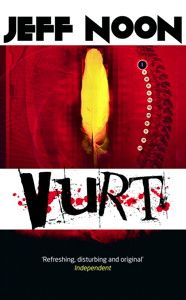To celebrate the 20th anniversary of classic Vurt , the top author speaks to Tom Hunter about inspiration, the passage of time and the state of SF literature today

A young boy puts a feather into his mouth...
So begins Vurt : the "Winner of the 1994 Arthur C Clarke Award" as it said on the cover of the vivid yellow and blue paperback I’d just picked up in WH Smiths.
Back then I hadn’t heard of the Clarke Award, but I’d certainly heard of Vurt . I kept seeing copies in odd places, friends kept pushing them at me, but this didn’t seem like the kind of book you borrowed. This was a book that wanted to be owned.
So there I was, clutching my copy, caught from the first sentence, and now, 20 years later, still hooked to Jeff Noon’s utterly original vision of a future reality only accessible by plugging a feather into the back of your throat.
Do I own Vurt , or does the Vurt own me? I have so many questions for Jeff, but only time for three…
Tom Hunter: How did the ideas that became Vurt first start to come together for you?
Jeff Noon: The creation of Vurt is a weird, convoluted story. I was working in Waterstones bookshop in Manchester in the early 1990s. I’d spent the previous years trying to make it as a playwright, without much luck. So I felt that a certain period of my live was coming to an end, the artistic side.
I was tempted into having one more go. Strangely, I chose a project with almost no commercial potential: a theatrical version of a French novel called The Torture Garden - a seriously out-there book published in 1899. At the same time, I was receiving news from America of the latest developments in virtual reality technology, the old headset and goggles style and I decided to combine the two
A few months later, a colleague at the bookshop told me he was starting a small press and would I have a go at writing a novel for him. Now, I’d never really tried novel-writing before, but I was keen to have a go: so I dug out the Torture Garden play, thinking it might make a useful starting point. I sat down one night and wrote the sentence: “Mandy came out of the all-night Vurt-U-Want clutching a bag of goodies”, and I was away. The book more or less poured out of me over the next few months, with no particular plot in mind beyond the search for the missing sister in the virtual realm. It was very much an improvised work, from beginning to end.
Vurt continues to influence new generations of writers, but does it still affect or leak into your own writing at all today?
Noon: Yes, Vurt still affects my work. I’m not a nostalgic person, not at all; I’m interested in Now and Tomorrow. That’s why I write SF. But the book’s ideas continue to flow through my work. I’m constantly drawn to melting borderlines and other worlds just beyond our own, and how people might have secondary lives in these other realms. But, I have changed in the past 20 years and so has the world, and I’m keen that my work reflects those changes in various ways. So, going back to the Vurt world in a very direct way, in order to write three new stories for the Tor 20th anniversary edition was a strange undertaking. It took a while to get back into it, to plug myself back into the Vurt , so to speak. But it was fun, once the transition had happened. I saw it as one more borderline, between now and then, a liquid area that I could hopefully negotiate in some interesting way.
We're celebrating the 20th anniversary of Vurt 's publication. How do you think science fiction has evolved, or devolved perhaps, since then?
Noon: I think the barriers between mainstream and genre fiction have liquefied to a degree, but not completely. We’re seeing mainstream writers exploring SF concepts, as well as SF writers borrowing from mainstream concerns. It’s much more of a give-and-take situation than it used to be. I really like the way in which the genres are blurring. All that said, I’ve always loved the fact that science fiction lives in a bit of a ghetto. It’s good that writers are able to experiment away from the media-supported, standardised, literary eye. I believe there are far more experiments going on in SF than in literary culture. I think this is one of the genre’s major accomplishments, and it needs to be celebrated.
To celebrate the 20th anniversary of Vurt , Tor are publishing a prestige hardback edition on Thursday 11 April, featuring a wittily Noon-style remixed introduction by fellow Clarke Award winner Lauren Beukes , as well as three new short stories by Jeff Noon, all set in the world of the Vurt . Find Jeff Noon online at metamorphiction.com and on Twitter as @JeffNoon . Tom Hunter is the administrator of the Arthur C Clarke Award and is on Twitter as @ClarkeAward .
